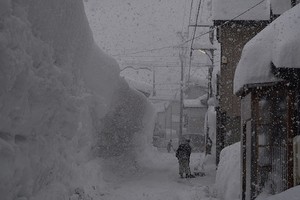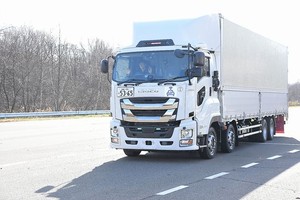REUTERS
June 16, 2022 at 11:45 JST
 People watch a TV showing an image of North Korea leader Kim Jong Un during a news program at the Seoul Railway Station in Seoul on June 13. (AP Photo)
People watch a TV showing an image of North Korea leader Kim Jong Un during a news program at the Seoul Railway Station in Seoul on June 13. (AP Photo)
SEOUL--North Korea appears to be expanding work at its nuclear test site to include a second tunnel, a U.S.-based think tank said on Thursday, as South Korean and U.S. officials say North Korea might conduct a nuclear test any day.
Preparation work at the Punggye-ri Nuclear Test Facility’s Tunnel No. 3 was apparently complete and ready for a possible nuclear test, the Center for Strategic and International Studies said in a report, citing commercial satellite imagery.
North Korea conducted six underground nuclear tests at the site from 2006 to 2017.
The research group said that for the first time, analysts spotted new construction activity at the facility’s Tunnel No. 4, “strongly suggesting an effort to re-enable it for potential future testing.”
Outside Tunnel No. 3, images showed a retaining wall and some minor landscaping with small trees or bushes, likely in anticipation of a visit by senior officials, it said.
The two tunnels were never previously used for nuclear tests and their entrances were demolished in 2018, when North Korea declared a self-imposed moratorium on testing nuclear weapons and its intercontinental ballistic missiles (ICBMs).
Leader Kim Jong Un has said he is no longer bound by that moratorium because of a lack of reciprocal steps by the United States during denuclearization talks, and North Korea resumed testing ICBMs this year.
South Korean officials said this week that North Korea was poised to conduct a nuclear test “at any time” and that the timing would be decided by Kim.
South Korea’s defense ministry spokesman, when asked about the report, said it was closely monitoring developments on North Korea’s nuclear activity together with U.S. intelligence authorities but declined to make any further comment.
South Korean Foreign Minister Park Jin said on Monday after talks with U.S. Secretary of State Antony Blinken in Washington that any provocation by North Korea, including a nuclear test, would be met with a united, firm response.
He urged China, for years North Korea’s only major ally, to use its influence.
Park also vowed to work to normalize an intelligence sharing pact with Japan “as soon as possible” to boost their responses to North Korea’s nuclear and missile threats.
The accord, the General Security of Military Information Agreement (GSOMIA), had been a backbone of trilateral security information sharing by South Korea, the United States and Japan.
But South Korea had considered scrapping the pact with Japan in late 2019, during a period of strained ties, before a last-minute decision to renew it in the face of U.S. pressure.
South Korean officials have said that since then, intelligence sharing with Japan had not been as smooth as it was before.




















A peek through the music industry’s curtain at the producers who harnessed social media to help their idols go global.
A series based on diplomatic documents declassified by Japan’s Foreign Ministry
Here is a collection of first-hand accounts by “hibakusha” atomic bomb survivors.
Cooking experts, chefs and others involved in the field of food introduce their special recipes intertwined with their paths in life.
A series about Japanese-Americans and their memories of World War II